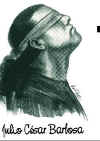I had been starving for music, for local music specifically. Sure, for weeks, I
had been exposed to music: music that accompanied the TV programs as my hosts watched,
music on the radio and music that was played over the PA systems in shopping areas. It was
the music that Argentinos and Chilenos listened to, but it was all imports from North
America, with some Mexican, Bolivian and Cuban pieces sprinkled in between. Where was the
local music? There had to be some local music out there!
 The folk musician in Recoleta.
From a casette tape I brought back (Click on the image to download the 1.2M audio file)
The folk musician in Recoleta.
From a casette tape I brought back (Click on the image to download the 1.2M audio file)
I did come across it eventually. In Osorno, I was walking near the bus terminal, stepping around groups of people with suit cases, packs and boxes, and all of a sudden, I could hear tatters of notes. No, this was no radio. I followed the strains and soon came to its source: a blind man in a rumpled suit playing the accordeon and singing along. He was standing with his back against the wall and a paper cup was pinned to his jacket so passers-by could deposit coins. He played the same tune again and again, singing the same words. I could not make out the meaning of the words, my Spanish wasn't yet good enough. The melody was strong and simple, and it's dancelike beat reminded of a reel. I felt this music was surviving the alien invasion because it was the music of outcasts. I have not yet been able to find in my library anything about such music and would welcome any background information. I suspect it just does not count.... I did see other performers of such music, in Puerto Montt and in Santiago, and even heard it on a CBC (Canadian Braodcasting Corporation) radio news item reporting on an economical conference in Chile. This music is alive and if you can find it on your trip, put a coin or two into the cup, on my behalf!
The churches were another place where music was performed. In the village of Baja
Mansa, just west of Osorno on the Pacific coast, I waited for the bus, late Sunday
afternoon. A modest building on the roadside proclaimed it to be a church and I could hear
through the door music accompanying the service: singing and a guitar. I did not go in, it
was too private a setting for a stranger to intrude.
In Osorno, at a square near the bus terminal, there is a modern catholic church. As I
entered and looked around, a service was in progress. I was surprised by the degree of lay
participation. Priest and frocked help was present but these did not drive the service; it
was lay folks (men and women) that stepped forward and read from prepared texts or from
the bible, with one person acting as Master of Ceremonies. There also was a choir of four,
including a lead singer. The music was mostly a chant where each line was presented by the
lead singer and then repeated by the chorus. It felt unique and particular to Chilean
culture.
I missed two events that I would have liked to attend: in Frutillar, the touristy town on Lago Llanquihue, there were posters for the concert series of the summer season and it looked pretty respectable. Unfortunately, the last concert was past when I visited. Then, in Osorno, I noticed men and women folk heading towards the Centro Cultural (I think that's what it was called), all dressed up: the men in Spanish style with short jackets and flat black hats and the ladies in evening gowns. It was a society event, and in my traveller's garb, I felt so intimidated that I did not ask what was on the program.
I did go to a concert of classical music eventually, in Santiago: in the Teatro Municipal De Santiago, a concert with Beethoven (Coriolan Overture and Piano Concert #4) and Tchaikowski (Symphonic Concert #4). About the audience: about 95% of the 800 (?) seats of the concert hall were taken, and they reminded me of the folks that attended the concerts in my home town in Germany where I was a teenager in the sixties: middle class and mostly middle age folks, most of them dressed up for the occasion, there were some young folks amongst them and smoking was permitted in the foyer. I did enjoy the concert, by the way...
And there was the folk music. That Sunday, I had cycled over to Recoleta, the fashionable and artsy part of Buenos Aires, and was eventually stretching out on the sloping lawn in front of the Basilica Señora del Pilar, with hundreds of other sunseekers. Some people were setting up the electronics for a performance and soon there was music. Julio Cesar Barbosa, a folk singer in his late-thirties, sang with his partner, a slender woman about his age, songs with titles like: Necesito una canción (I Need a Song), Sin ver el sol (Without Seeing the Sun) and Pre-Juicio (Prejudice). The tunes were folksy, and sung with the urge that we find in serious folk music. His audience was enthusiastic and mostly young: a few girls seemed to know the words to all his songs. I was witnessing a bit of the country's non-mainstream musical life, just one of the many pieces that make up this big jigsaw puzzle, this nation's soul.
